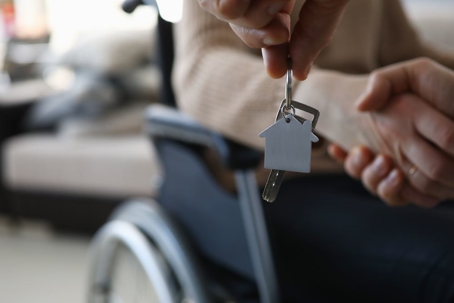Mainstream vouchers provide federally funded housing assistance to persons aged 18 to 61 with a disability, who are homeless, are living in an institution, or are at risk of homelessness or institutionalization. Mainstream vouchers are unique in that they can help any household that includes a qualifying person lease affordable private housing of their choice.
How Do They Work?
Mainstream vouchers assist families with one or more qualifying individuals in paying for a portion of their monthly rent directly to their landlord. The household or person will pay around 30 percent of their income toward rent, and the agency or nonprofit with access to the vouchers pays the rest.
Qualifying individuals or families cannot apply for vouchers directly themselves. Instead, they must work with a local agency or nonprofit that has been granted voucher funds to access these benefits. If you are hoping to access these benefits for your family or loved one, you must provide documentation to verify the age, disability, and housing status of the proposed qualifying person.
If the qualifying person will be between the ages 18 to 61 at the time of application, you may be able to request a Mainstream Voucher Program interest form from your local agency. Keep in mind that there are limited vouchers available to each community.
What Is a Qualifying Disability Under the Mainstream Voucher Program?
To qualify for the voucher program, adults between the ages of 18 to 61 must meet one of the following federal disability requirements:
1. They must be receiving Supplemental Security Income (SSI) as a result of their disability.
2. They must be unable to work for 12 months or more, due to a medically documented physical or mental condition.
3. They have a physical, cognitive, or emotional condition that:
- will continue long-term or indefinitely;
- substantially interferes with their ability to live on their own; and
- would, with better housing conditions, improve their ability to live independently.
4. They have a severe and chronic disability that:
- is associated with one or several mental or physical conditions;
- will likely last a lifetime;
- causes significant limitations in three or more areas related to self-care, communication, learning, ability to move freely, independent living, and economic self-sufficiency; and
- as a result, requires that they receive lifelong, individualized support.
Increased Funding for the Mainstream Voucher Program Now Available
Congress has, in recent years, appropriated greater funding to the Mainstream Voucher program, administered by the U.S. Department of Housing and Urban Development (HUD). In July 2022, HUD announced it would award more than $36 million to 218 public housing agencies in 46 states to assist people with disabilities in accessing affordable housing. This news coincides with the 32nd Anniversary of the Americans with Disabilities Act.
In commemoration of this important development, HUD Secretary Marcia L. Fudge stated, “It is a right of every person with a disability to live and fully participate in the community and not be relegated to institutional settings or homelessness. Affordable community-based housing is essential to helping ensure this right. The funding HUD is awarding today will provide communities with additional resources to help people with disabilities exit or avoid institutional settings and exercise their rights to community living.”
Contact your special needs planner for more information on mainstream vouchers and how to access them.

